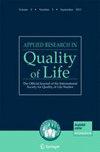Impacts of Early Youth Unemployment Self-Esteem and Quality of Life: Moderating Effects of Career Unemployment
Abstract
This study examines the effects of early youth unemployment and career unemployment on young adults’ self-esteem and quality of life using the survey data from the Youth Panel of the Korea Employment Information Service collected from 2007 to 2020. The study found a stigma effect that increases the probability of career unemployment as the duration of early unemployment experienced by young adults in the entry into the labor market increases. The duration of unemployment negatively affects self-esteem, confirming a psychological stigma effect that alters the psychosocial status of individuals. In addition, unemployment duration harms the quality of life of young adults, confirming that joblessness leads to increased dissatisfaction and a decline in quality of life in many domains. Further, subsequent unemployment experiences of young adults later in their careers exacerbate the negative impact of early unemployment on self-esteem and quality of life. This study demonstrates that youth unemployment is not only a temporary setback for individuals who are not economically active but also a mechanism that exacerbates the subsequent significant socioeconomic costs of unemployment.


 求助内容:
求助内容: 应助结果提醒方式:
应助结果提醒方式:


